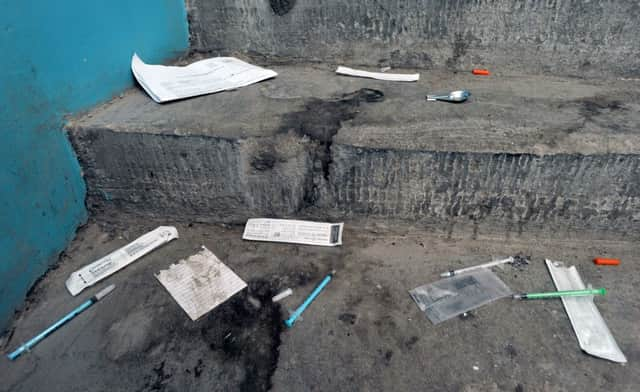Leaders: Drugs have fallen off political radar


It seems, like in Scotland last year, and earlier, that the UK is now seeing every issue through the constitutional prism, and the issues that are hard to see through that prism just do not get seen. As far as election issues go, defence, and foreign policy (with the exception of foreign aid) have barely raised their heads.
Another one is drugs, but it is difficult to see why this scourge is no longer a live political issue.
Advertisement
Hide AdAdvertisement
Hide AdA more equitable society that protects the vulnerable, and the economy, have been by far the biggest battlegrounds the political parties have picked.
According to the Scottish Government, drug misuse costs the country £3.5 billion a year. That is not an unsubstantial sum even for government. It is three times the saving Police Scotland is expected to make.
Now it is revealed that an analysis of drug deaths in 2013 by the NHS Information Services Division showed that 76 per cent of those who died were male and half lived in the most deprived areas of Scotland.
It also says that almost two-thirds of those analysed in the figures had a psychiatric condition recorded in the six months before they died.
So the people drugs are killing are on the whole people in deprived areas, and sick people (although that may be caused by drug use), but more importantly they are people in the system.
And those figures about deaths, tragic though they are, do not reflect the horror and misery the drugs and subsequent downfalls bring to countless others; wives, husbands, mothers, fathers, brothers and friends.
Perhaps the view is that drugs, which were a headline problem back in the day but which have now largely dropped off the political agenda, are a problem that is going away. Yes, drug deaths are going down, thankfully, but it is worth remembering that the number is still about 50 per cent higher than ten years ago.
Maybe the difficulty is a practical one, and the problem is just very hard to tackle. That is almost certainly true but what that must mean is that anything – and everything – that can be done to tackle it is done.
Advertisement
Hide AdAdvertisement
Hide AdThe most recent figures show new “legal highs” are responsible for a growing number of drugs deaths.
The Scottish Government set up an expert review group as to what legal measures could be taken in the fight against legal highs, and that group reported earlier this year.
Hopefully the government will look at the success of measures in Ireland to tackle just this problem and take similar action. Slowness of government to act allows the criminal gangs that peddle misery better chances at evasion.
Verdict is returned, for good or ill
Alan McLean lost his son in tragic circumstances and is fully deserving of our sympathy. Barry McLean was stabbed to death and his father has told of the devastation that has wrought in family lives.
The man accused of murdering Barry McLean was cleared by a jury at the High Court in Edinburgh in 2012. Now Alan McLean is petitioning MSPs asking for a change in the law to allow trial judges the power to refer “irrational, unsupported or unbelievable” verdicts of acquittal to the appeal court.
He also called the current system of jury selection a lottery and called for a suitability test for potential jurors.
The fact is that the jury system is not a perfect system. But it does carry some very fundamental benefits which is why it is in common usage throughout the world. It is believed that being tried by a jury of your peers means judgement is reached reflecting the spread of values in society, it is not just the values of a legal system or the values of the learned judges but an egalitarian view which will be all the more rounded and better for it.
That will produce some results that people might find perverse, particularly if they have a very personal stake in it.
Advertisement
Hide AdAdvertisement
Hide AdOf course there are already instances of trials without juries, complicated fraud trial for instance. And it is right to look to see if the jury trials can be improved. Hopefully Mr McLean’s intervention will highlight the concerning lack of research surrounding juries and their decisions.
But judges should not be given the right to challenge it.
That verdict, even if it is flawed, has to be, in a democracy, valued for where it has come from.